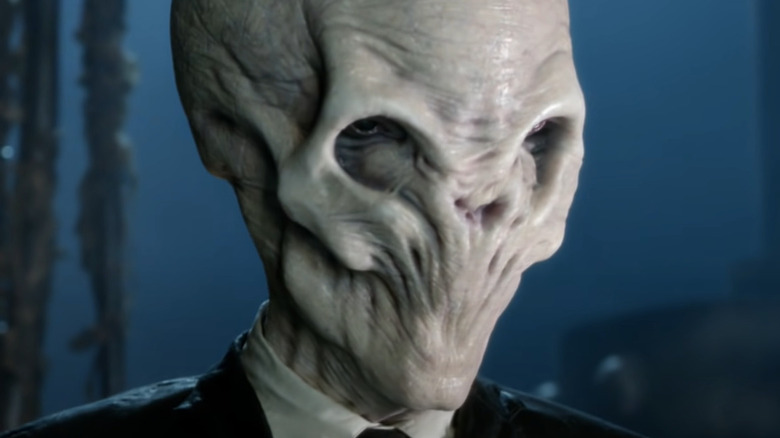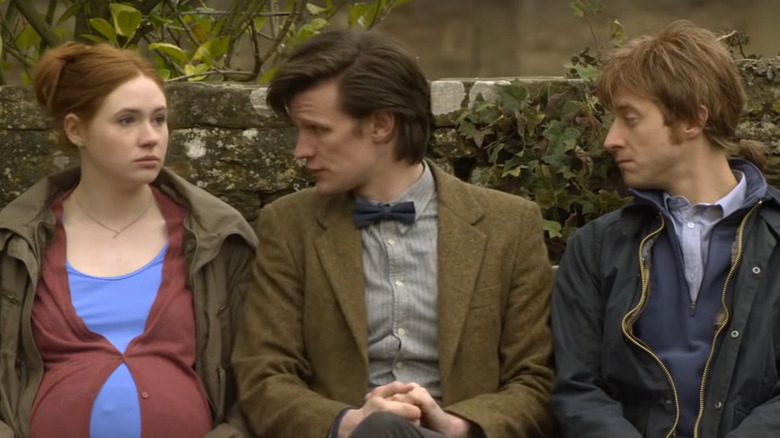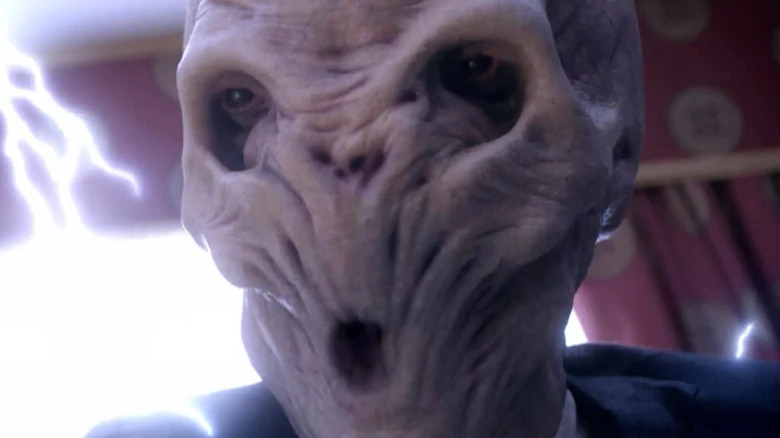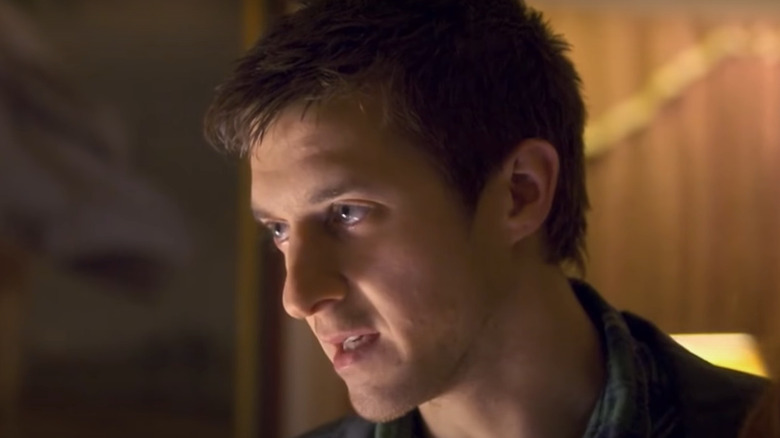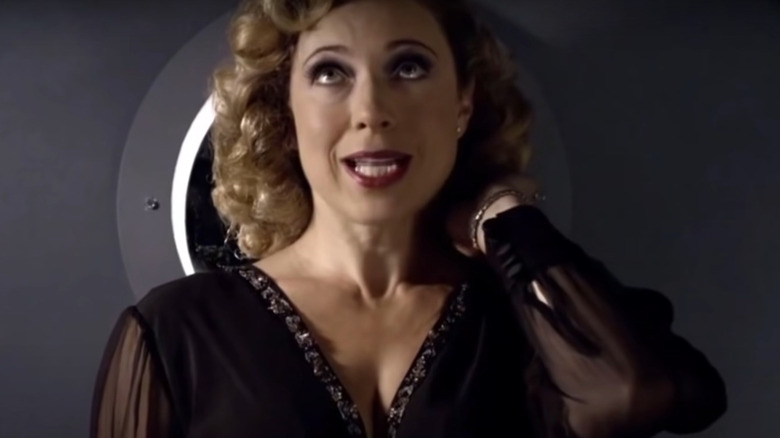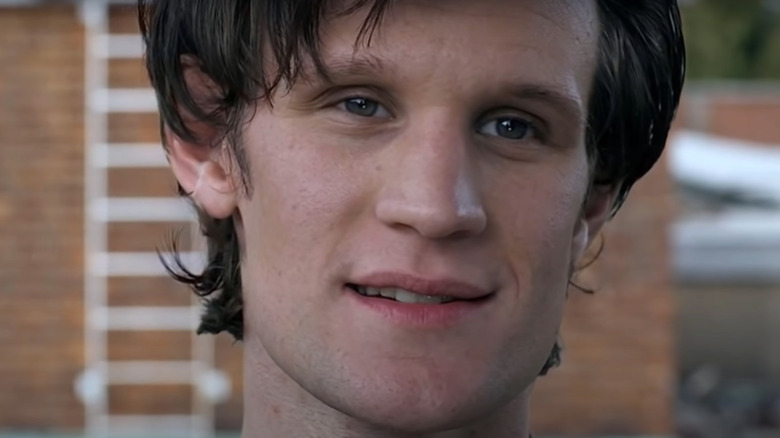The Ending Of Doctor Who Season 5 Explained
"Doctor Who" is the BBC's Energizer Bunny — meaning that it's the science fiction drama series just keeps going and going and going and going. The story follows the Doctor, an alien demigod from the race of Time Lords, and their travels through space and time in a pimped out telephone booth. Sometimes, the Doctor looks like David Tennent, other times, like Jodie Whittaker. Soon enough, Ncuti Gatwa will take on the role.
With a canonically shape-shifting protagonist and a plotline so complicated that it can make "Lost" feel found, "Doctor Who" isn't always the easiest series to follow. Season 5 (or Series 5, if you're British), for example, opens with entirely new cast of characters, heretofore unseen, including a brand new Doctor in Matt Smith. Here's a primer for that very arc, to help untangle the looping and retcons and confusion that naturally comes with being a fan of "Doctor Who."
A quick space opera refresher course
As previously mentioned, Season 5 of "Doctor Who" introduces a fresh batch of faces for the viewers to meet, so here's a quick rundown of what goes down. The Eleventh Doctor (Matt Smith) travels with Amy Pond (Karen Gillan) after they work together to save the earth from overly aggressive space cops who were willing to blow up the whole planet to stop a single escaped prisoner. Aside from the allure of traveling across space and time, Amy chose to join the Doctor as a last ditch effort to be with the man she loved as a kid (the Doctor crashed the TARDIS into her backyard as a child, causing her to fall in love with the "raggedy doctor," it was a whole thing). This would be romantic, were it not for her engagement to Rory Williams (Arthur Darvill) and their impending nuptials.
They're eventually accompanied by Rory, who dies but gets better, and River Song (Alex Kingston), a mysterious woman with secretive ties to the Doctor. Along the way, the company encounter unexplainable cracks that consume and erase anything they touch in a profoundly disturbing way.
The season comes to a head when the Doctor travels to 102 A.D. because of a summons from River, who found a painting from Vincent Van Gogh that depicted the TARDIS exploding. And here's where things take a menacing turn.
The Silence are messy assassins
Though only visible through their actions, and spoken of only in passing, the Silence are at the heart of Season 5's main mystery. The religious cult, packed with bobble headed Slendermen who are literally impossible for onlookers to remember the second they're not in view, has one mission in Season 5 (and more prevalently in Season 6, but let's not get too far ahead of ourselves) — and that's to kill the Doctor before he can do more damage.
The problem is that they're really, really bad it. Their plots are nothing short of Rube Goldbergian in nature.Seriously, instead of directly attacking the Doctor, they sabotage the TARDIS in hopes that he knows less about its inner working than they do. What's worse, though, are the side effects of their failed assassination attempt ... that is, the aforementioned cracks.
The cracks consume hundreds –- that are shown, at least -– of innocent souls before the TARDIS even gets close to exploding, which kind of defeats the whole point of killing the Doctor to save the universe. That being said, the Silence is a religious society, and such groups are well known for brutalizing the innocent with a warped version of the Trolley Problem, so their actions certainly aren't out of character.
Rory is the gold standard for partners everywhere
Rory is a steadfast, confident man when it comes to his love, which is adorable because he is literally none of those things in any other aspect of his existence. In a daily sense, he's nonconfrontational, he's bashful, he's a walking doormat. But for Amy, Rory will guard an ancient prison cell (that was designed to entrap a Time Lord in permanent stasis and thereby prevent said Time Lord from destroying the galaxy with flagrant misuse of a time machine) for two millennia. In case it wasn't clear, that's not a hyperbole. Rory does exactly that.
He guards Amy — who is inside the Pandorica (that ancient prison cell) and on the cusp of death — through the entirety of human history, through wars and loneliness, and boring museum gigs. While it is certainly possible that he second guessed his choices at some point over this time, his actions never indicate it. From the moment the Doctor leaves him, till the moment the Doctor returns to cure Amy with DNA from her living, younger self, Rory protects his heart. He's not even officially married yet, and that is the kind of dedication he provides.
Amy Pond's heroism is ignoble at best
In the kindest terms possible, Amy is at the beginning of her character arc for the entirety of Season 5. Unlike Rory, who never sways from his devotion to her, Amy doubts her choices constantly. She doubts her career choices, she doubts her worth, and she especially doubts their looming marriage, which is why she runs away with the Doctor in the first place. What Amy doesn't doubt, however, is her want for companionship, which is perhaps the more likely cause for the heroism she displays in the finale.
Amy's memories bring Rory back to life — it's complicated — because, even though she can't remember him, she misses his dutiful love. Later, when the dust settles and the two finally marry, that same process revives the erased Doctor (also complicated, but now involving an exploding TARDIS). Later seasons show her becoming more altruistic, more reciprocal, to be far. But at this point in Season 5, she's just afraid of altering the status quo, and like anyone who runs from the future, she almost destroys it in the process.
River Song teases a wild future
Considering her first appearance was across from the Tenth Doctor (David Tennent) where we saw her die and have her consciousness digitally uploaded to a space library's mainframe, River Song's continued appearances in the series have an understandable air of baffled intrigue. Although she refuses to reveal all of her secrets in the finale, instead opting to scatter a few flirtatious hints, the Doctor realizes that she is someone incredibly dear to him, just not yet.
The interesting thing is that the Doctor has the opportunity to discover her history — and his future — by looking through her diary, but he chooses to keep it a mystery. Had he peaked, he would have learned that she would become his wife, and that the two would continue to meet in chronologically reverse order, which is why the first time he meets her is the last time she ever sees him. That's the joy of time travel, nothing ever get to make sense!
The Eleventh Doctor is the class clown
While every Doctor is a variant of the same person, they are each characterized by a wildly different personality. The Eleventh Doctor is — in a word — goofy. He's lighter than the Tenth Doctor, and less afraid than the Ninth Doctor (Christopher Eccleston). He's also more comfortable viewing others as lesser, even though he's famous for saying "In 900 years of time and space, I've never met anybody who wasn't important."
In The Doctor's final days as the Tenth Doctor, he was on the verge of a violent mental break, so it's possible that the Eleventh Doctor's profound silliness is entirely a farce to convince himself that everything is okay. It would also explain why he so utterly abandons the friendships he had accrued in the prior seasons, because to be around them would cause unpleasant memories to resurface.
The Eleventh Doctor is petulant, yes, but he seems to recognize it because he goes out of his way to act in opposition to his cruel opinions, chasing whimsy and kindness with blank eyes.
